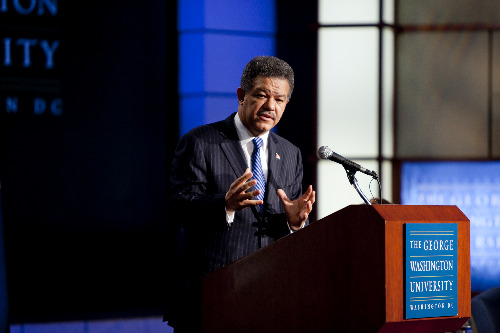
President of the Dominican Republic Leonel Fernandez touted the democratic achievements of Latin America and his Republic’s involvement in the relief efforts in Haiti during a speech Tuesday in the Jack Morton Auditorium.
While the Caribbean nation is politically stable, Fernandez acknowledged that issues like drug trafficking and government corruption still plague other countries in the region.
“The most pressing issue has to do with security, drug trafficking, violence and trans-national crime,” Fernandez said after a question about his meeting with President Barack Obama.
After their meeting Monday, Obama praised Fernandez for the Dominican Republic’s role in the relief efforts in Haiti. Fernandez said his country has been crucial to Haiti’s survival.
“The recovery process is very slow and has not really created an impact on the Haiti population,” Fernandez said. “We feel hopeful that the situation will evolve positively.
Fernandez said the Dominican Republic offered both financial and social support to Haiti – with Dominican doctors treating Haitians following the quake and plans to build a new university in Haiti. The Dominican Republic and Haiti are neighbors on the island of Hispaniola.
The speech also focused on the history of democracy in Latin America, which is a recent development Fernandez said.
“Because we had weak economies and because we didn’t have a capitalist government economy, this reflected politically in having weak democracies…we had dictatorships everywhere,” Fernandez said. “It is after the Mexican Revolution that we can speak about a first wave of democracy in Latin America.”
Fernandez said international economic events – like the U.S. Great Depression in the 1930s which created an “atmosphere for dictatorships,” – have tremendous impacts on the governments of Latin American.
“The Great Depression had an enormous influence in the political outcome of Latin America,” Fernandez said. “Thirteen governments were overthrown by military coup d’états between 1930 and 1939.”
Fernandez said much of Latin America is now in a cycle of democracy but events like the coup d’état in Honduras last June worried democratic leaders.
“So much blood has been shed in the name of democracy and freedom that we cannot accept a reversal in terms democracy and good government in Latin America,” Fernandez said. “That is why we condemned so harshly the coup d’état that took place in Honduras.”
While Latin America has not had a financial crisis of its own, a loss in trade revenue has resulted in increasing debts, he said.
“We have to bring down unemployment, reboost the housing market and we have to make the economy strong again,” Fernandez said “When the economy is strong, we can deal with the fiscal government and deal with the debt.”
University President Steven Knapp and University Marshal Jill Kasle both made remarks at the event, with Knapp noting a recent trip to the Dominican Republic in which he met with Fernandez.
“Since then, the partnership between the Dominican Republic and GW has continued to develop,” Knapp said, touting a recently established sustainable tourism development program at GW that works with the Dominican Republic. “We are grateful for President Fernandez’ offer to address our community this morning.”
Senior Ernesto Apreza said he enjoyed the speech and that the president expressed a positive outlook for the future of Latin America.
“I felt like he wasn’t trying to cover up anything,” Apreza said. “It just seemed like he was being honest, he acknowledged there was a huge problem with drug trafficking.”




